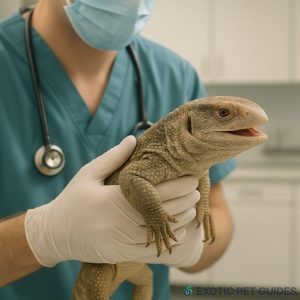Introduction
Savannah Monitors are hardy lizards, but like all reptiles, they are prone to specific health issues in captivity—especially if husbandry isn’t optimal. Early detection and proper care can make the difference between life and death. This article outlines the common health problems, warning signs, and what you can do to prevent or treat them.
1. Obesity: The #1 Health Risk
Overfeeding fatty foods (especially rodents) and lack of exercise lead to obesity, the most common and deadly issue in captivity. Obese monitors often appear swollen with fat at the base of the tail, underarms, and abdomen.

2. Metabolic Bone Disease (MBD)
Caused by lack of calcium, vitamin D3, or UVB exposure, MBD weakens the bones. Symptoms include:
- Soft jaw or limbs
- Swollen joints
- Tremors or difficulty walking
🛡 Prevention: Provide strong UVB lighting and calcium supplements.

3. Respiratory Infections
Poor temperatures or humidity can lead to respiratory infections. Look for:
- Wheezing or clicking sounds
- Open-mouth breathing
- Nasal discharge
💡 Raise ambient temps and visit a vet promptly if symptoms persist.

4. Internal Parasites
Wild-caught or improperly sourced food can introduce parasites. Symptoms include:
- Sudden weight loss
- Diarrhea
- Lethargy despite eating
💉 Fecal exams and anti-parasitic medications from a reptile vet are essential.

5. Dehydration & Shedding Problems
Savannah Monitors need proper humidity (40–60%) to stay hydrated and shed properly. Signs of dehydration include:
- Sunken eyes
- Dry, flaky skin
- Lethargy
✅ Provide a water dish large enough for soaking and mist the enclosure if necessary.

When to See a Reptile Vet
If you notice any of the following, seek veterinary care immediately:
- Severe weight loss or bloating
- Open wounds or abscesses
- Refusal to eat for more than 2 weeks
- Difficulty walking or immobility
🔍 Look for herp-specialized veterinarians—general vets may not have the expertise.
Final Thoughts
Keeping your Savannah Monitor healthy is about proactive care, proper diet, and closely watching for early symptoms. Prevention through husbandry is always cheaper—and more effective—than treatment later on.